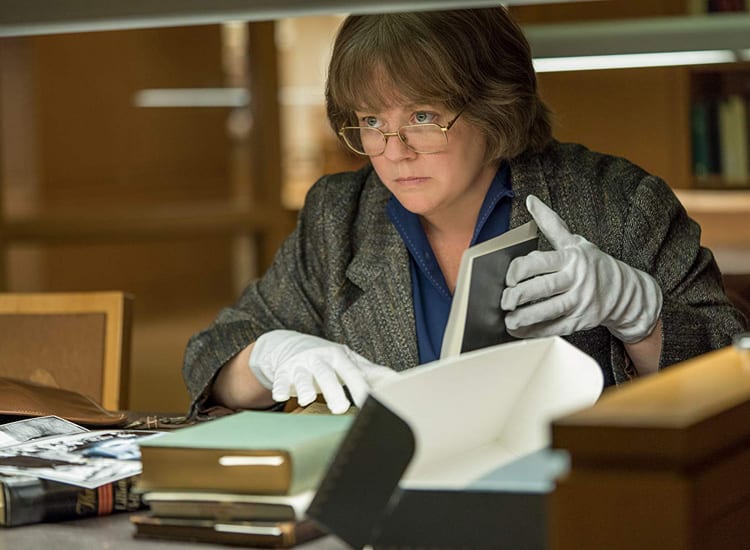Adapting true stories to the screen can be tricky. If a real-life event is being made into a movie, there’s a good chance the story is interesting enough on its own, but filmmakers often alter events to give them structure. And that’s not a bad thing. Incredible true stories don’t automatically make good movies: not everything happens for a compelling reason, and there’s no one alive that doesn’t need a little punching up to become a protagonist. “Can You Ever Forgive Me?” knows that its story isn’t special—and yet, that’s precisely why it’s remarkable.
The movie is based on the autobiography of criminal writer Lee Israel. If ‘criminal writer’ seems like a nonsensical collision of careers, then you probably don’t know enough people trying to get by on wordsmithing. Israel is caught in the conundrum that many professional writers know: among being a good writer, being proud of your writing, and getting paid for your writing, you can only pick two. After making a name for herself with biographies about successful women, Israel ends up broke when her publisher tells her there’s no audience for her planned book on Fanny Brice. Destitute and desperate for money, Israel heads to a library to study up on Brice, and happens upon an authentic letter written by her muse.
She knows that Brice’s letter could fetch some cash. Earlier on, she was forced to sell a letter that a famous author wrote her personally, and was paid a large sum for it. You see, there’s a throng of high-class literary snobs who collect the letters of well-known writers, and a few hundred for an old piece of paper is nothing to them. The letters have to reflect their authors’ skill and personality, though—the Fanny Brice letter isn’t terribly exciting, so Israel is offered next to nothing for it. That’s when she’s struck by the idea for her criminal enterprise.
Using a typewriter and a well-copied signature, Israel forges her own Fanny Brice letter and soaks it in sarcasm. The snarky fake fetches Israel enough money to pay her rent. The deal is sealed—this is Lee Israel’s new calling. “Can You Ever Forgive Me?” is structured like a classic crime movie: as Lee forges ahead, she develops a talent for embodying the voices of renowned writers, and hits the sweet spot of living large while doing something she loves. Inevitably, she slips up and attracts the attention of law enforcement. The movie fits the rise and fall of the crime genre.
But its tone couldn’t be more different. “Can You Ever Forgive Me?” is a melancholy movie through and through. Israel’s version of living large is just being able to pay rent, buy groceries, and survive. Crime only pays enough for her to feed her cat. She gets paid to do something she loves, but she can’t ever be recognized for her writing talent. She’s still a lonely, aging woman with a thankless job that won’t last forever. New York, so often portrayed in crime film as a city of contrasting vibrancy and darkness, is shot here as morose and grey; a looming landscape that spits out artists and rewards the elite. The movie’s cinematography, color grading, and score enhance the blues of the working class. In this context, it’s hard not to identify with Lee Israel—unless you’re one of the wealthy elite, in which case the movie confronts you with a wry smile and a raised middle finger.
Israel was a woman of such acerbic wit that no amount of gloom could tame her tongue, and “Can You Ever Forgive Me?” keeps her spirit alive with wickedly funny dialogue. The banter between Israel and her grifter friend Jack Hock is particularly sharp. Their insults—whether they’re directed at the upper class, each other, or themselves—always hit their marks. Richard E. Grant is devilishly delightful as Hock, and his verbal spars with Melissa McCarthy enliven their dreary environment.
McCarthy is exceptional here. Her performance as Lee Israel is unquestionably the best of her career: she scales her comic sensibilities back into a hidden weapon, one that she whips out to keep others at a distance and keep her fragile world insular. Like Israel’s favorite drinks, she’s bitter, but she sure makes you feel good. If the movie has one flaw, it’s that Israel’s struggle to open herself up to criticism is underwritten—the screenplay handles her growth exquisitely in every other aspect. Anne McCabe’s editing further heightens McCarthy’s performance: the movie knows exactly when to cut to a reaction shot, and in those moments, McCarthy’s eyes communicate exactly what we need to know about Lee Israel.
“Can You Ever Forgive Me?” is a superlative film. It’s simultaneously world-weary and entertaining, like the performances at its center. It’s a feminist tale—the built-in allegory of a woman unable to take credit for her work is not lost on the filmmakers—and a biting commentary on the classism bred from the capitalization of art. It’s a fascinating portrait of Lee Israel that left me wanting to read her autobiography immediately. Writers, especially, should seek it out soon—if only to feel a little solidarity.
★★★★½ (4.5/5)




